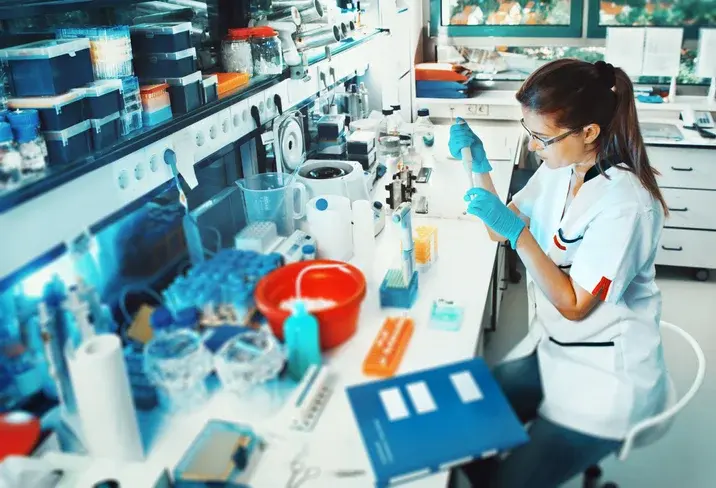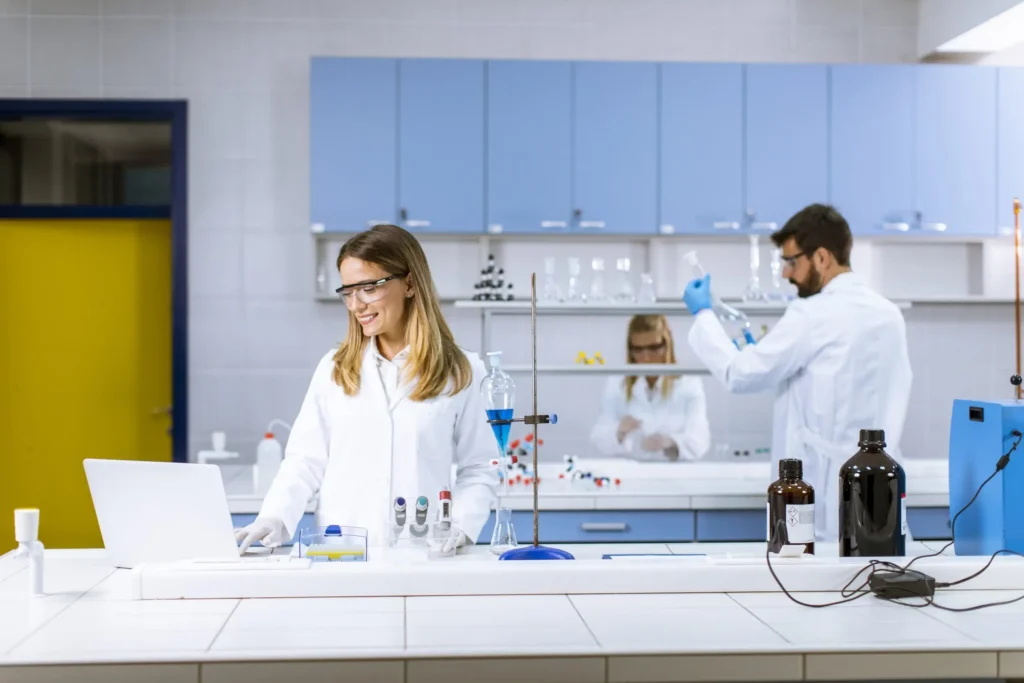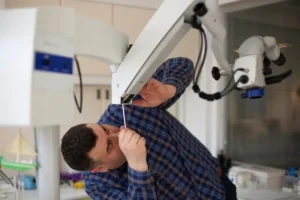In today’s fast-paced world, biological technology, often referred to as biotech, is at the forefront of innovation, helping to address challenges in healthcare, agriculture, environmental conservation, and beyond. With rapid advancements in this field, there is a growing need for biological technology consultants who can guide companies and organisations through the complexities of biotech developments and their practical applications.
This article will explore the role of a biological technology consultant, the skills required, the industries they serve, and how they contribute to innovation. We will also cover how to become a consultant in this field, the benefits of hiring one, and the future of biological technology consulting. Whether you’re interested in becoming a consultant or hiring one, this guide will provide a comprehensive understanding of the field.
What is a Biological Technology Consultant?
A biological technology consultant is a professional who specialises in advising businesses, organisations, and government entities on the development, implementation, and management of biotechnology. Their expertise spans areas such as medical biotechnology, agricultural biotechnology, bioinformatics, environmental biotechnology, and more.
Biotech consultants provide tailored solutions, helping their clients to innovate, improve efficiency, and solve complex biological problems. This could range from advising pharmaceutical companies on drug development to helping agricultural firms improve crop yields using genetic engineering.

Key Responsibilities of a Biological Technology Consultant
The exact responsibilities of a biotech consultant can vary depending on the client and the specific project, but generally, they include:
- Research and Analysis: Conducting in-depth research on biological technologies, current trends, and the competitive landscape.
- Strategic Planning: Helping companies develop strategies to integrate biotechnological innovations into their operations. This might include advising on product development, clinical trials, or laboratory processes.
- Compliance and Regulation: Ensuring that clients comply with all relevant regulations, including FDA guidelines, environmental standards, and ethical concerns related to biotech innovations.
- Project Management: Overseeing biotechnology projects from conception to completion, ensuring they meet deadlines, budgets, and quality standards.
- Training and Education: Providing training and support to help clients understand new technologies, protocols, or software applications.
- Collaboration: Working with multidisciplinary teams, including biologists, engineers, and business leaders, to create innovative solutions.
Industries that Benefit from Biological Technology Consulting
Biological technology is a diverse field that impacts various sectors. Consultants in this field often specialise in one or more industries, depending on their expertise. Here are some of the key industries that rely on biological technology consultants:
Healthcare and Pharmaceuticals
The healthcare and pharmaceutical industry is one of the primary sectors where biological technology consultants play a crucial role. They help pharmaceutical companies develop new drugs, improve existing therapies, and streamline processes for clinical trials. Consultants might also work with healthcare providers to introduce cutting-edge biotech solutions, such as gene therapy, personalised medicine, and biologics.
- Example: A biotech consultant could assist a pharmaceutical company in navigating the complex regulatory processes involved in bringing a new drug to market, ensuring it meets FDA standards and passes clinical trials efficiently.
Agriculture and Food Technology
In agriculture, biological technology consultants assist in developing new crop varieties through genetic modification or gene editing (such as CRISPR technology). These innovations help improve crop resistance to pests, enhance yield, and reduce the environmental impact of farming practices. Consultants also advise on biotechnology in food production, such as lab-grown meat or genetically modified organisms (GMOs) that enhance nutritional value.
- Example: A consultant might work with an agricultural company to implement sustainable biotech solutions, such as developing drought-resistant crops that can withstand climate change.
Environmental Biotechnology
Environmental biotechnology consultants help address ecological issues by developing technologies that can clean up pollution, treat wastewater, or produce renewable biofuels. Their work is essential for companies looking to reduce their environmental footprint and improve sustainability.
- Example: A consultant could assist a municipality in implementing biotech solutions for waste management, such as using microbes to break down toxic chemicals in landfills.
Biomanufacturing
Biomanufacturing involves using living systems, like cells or microorganisms, to produce commercial products, including vaccines, biologics, and biofuels. Biological technology consultants help companies optimise biomanufacturing processes, ensuring efficient production and high-quality outcomes.
- Example: A consultant might work with a biopharmaceutical company to improve its cell culture processes, making the production of a particular biologic drug more cost-effective.

Biotech Startups and Innovation
Startups in the biotech space often rely on consultants to help them bring new innovations to market. Whether it’s developing cutting-edge medical devices or launching a new genetic testing service, consultants provide expertise in both the science and business sides of biotech ventures.
- Example: A biological technology consultant could help a biotech startup develop its product roadmap, ensuring that it aligns with market needs and regulatory requirements.
How to Become a Biological Technology Consultant
If you’re passionate about biology and technology and have a knack for problem-solving, becoming a biological technology consultant could be a rewarding career path. Here are the steps typically involved in entering the field:
Education and Qualifications
Most biological technology consultants have at least a bachelor’s degree in a relevant field, such as biology, biotechnology, bioengineering, or biochemistry. However, many employers prefer candidates with advanced degrees, such as a Master’s or Ph.D., especially for highly technical or research-heavy roles.
In addition to formal education, certifications in biotech-specific areas, such as clinical research or regulatory affairs, can enhance your credentials.
Gaining Industry Experience
Experience in the biotech field is crucial for becoming a successful consultant. Working in roles such as a biotech researcher, lab technician, or project manager can give you the hands-on knowledge you’ll need to advise clients effectively.
Many consultants start their careers in biotech companies, research institutions, or pharmaceuticals before transitioning to consulting.
Developing Consulting Skills
In addition to your technical knowledge, you’ll need strong consulting skills. These include:
- Communication: Being able to explain complex biological concepts to non-experts is key in consulting.
- Problem-Solving: You’ll often be tasked with finding innovative solutions to technical challenges.
- Project Management: Consultants must manage multiple projects, stay on top of deadlines, and coordinate with diverse teams.
It’s also helpful to gain experience in business strategy, as biotech consulting often involves advising on market trends, competitive analysis, and business growth.
Building a Professional Network
Networking is essential for anyone entering the consulting world. Attending biotech conferences, joining professional organisations like the Biotechnology Innovation Organization (BIO), and connecting with professionals on LinkedIn can help you find job opportunities and stay updated on industry trends.
Joining a Consulting Firm or Starting Your Own Business
Most biological technology consultants either work for consulting firms that specialise in biotech or start their own independent consulting businesses. If you’re just starting, working for an established firm can give you valuable experience and a network of clients.
On the other hand, if you prefer independence and have a strong network of potential clients, starting your own consulting business could be a viable option.
Why Hire a Biological Technology Consultant?
Hiring a biological technology consultant can provide significant benefits for companies operating in biotech and related industries. Here are some reasons why businesses choose to work with consultants:
Expert Knowledge
Biotech is a rapidly evolving field, and staying up-to-date with the latest developments requires in-depth knowledge. A consultant brings expertise in specific areas like gene editing, biologics, or bioinformatics, ensuring that the company can adopt the most advanced solutions.
Cost-Efficiency
Hiring an in-house team of biotech experts can be costly, especially for smaller companies or startups. A consultant offers a flexible solution, providing expertise only when needed and reducing the overall cost of hiring full-time staff.

Regulatory Compliance
Navigating the complex regulatory landscape of biotechnology, especially in fields like pharmaceuticals or agriculture, is challenging. A consultant can ensure that a company adheres to all regulations, helping to avoid costly legal issues or delays in bringing products to market.
Innovative Solutions
Biological technology consultants often bring fresh, innovative perspectives to problem-solving. Their experience working with different companies and sectors allows them to provide creative solutions that internal teams might not have considered.
Also read Best Technology LinkedIn Background
The Future of Biological Technology Consulting
As biotechnology continues to advance, the demand for biological technology consultants will likely grow. Several trends are expected to shape the future of the consulting industry:
Personalised Medicine
The rise of personalised medicine, which tailors treatments based on an individual’s genetic makeup, is transforming healthcare. Biological technology consultants will be essential in helping pharmaceutical companies and healthcare providers implement these personalised therapies, from drug development to patient care.
Sustainability and Environmental Biotech
With increasing concerns about climate change and environmental sustainability, biotech solutions are being developed to address issues like carbon capture, renewable energy, and sustainable agriculture. Consultants in this space will play a key role in helping companies adopt environmentally friendly biotech innovations.
Artificial Intelligence in Biotech
Artificial intelligence (AI) is becoming more integrated into biotechnology, helping with tasks like drug discovery, genetic sequencing, and predictive analytics. Biological technology consultants with knowledge of AI and machine learning will be in high demand as these technologies continue to shape the industry.
Bioinformatics and Big Data
As the amount of biological data being generated continues to grow, the ability to analyse and interpret this data is crucial. Bioinformatics, a field that combines biology, computer science, and data analysis, is expected to be a major area of growth. Consultants with expertise in bioinformatics will help companies harness big data for innovations in genomics, proteomics, and other areas of biology.
Conclusion
A biological technology consultant plays a critical role in the biotech industry, providing expert guidance on how to navigate complex challenges and drive innovation. Whether you’re interested in becoming a consultant or hiring one, understanding the responsibilities, skills, and industries involved is key to success.
As biotechnology continues to evolve, biological technology consultants will remain essential in shaping the future of healthcare, agriculture, environmental science, and beyond. With the right expertise and experience, consultants can help businesses and organisations harness the power of biotech to improve efficiency, develop new products, and contribute to a better world.




